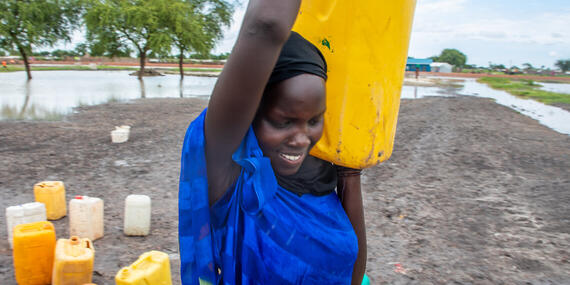Today's top news: Occupied Palestinian Territory, Global Humanitarian Overview, Sudan, South Sudan

Occupied Palestinian Territory
OCHA reports that by last night, 100 trucks carrying humanitarian supplies had entered Gaza from Egypt, the same volume as in most days since hostilities resumed on 1 December. This is well below the daily average of 500 truckloads, including fuel, that entered every working day prior to 7 October.
Over the weekend, a daily average of 150,000 litres of fuel entered from Egypt, up from a daily average of 67,000 litres in the previous three days. The increased amounts are the bare minimum needed to prevent the collapse of critical services, including hospitals and ambulances, water and sanitation infrastructures, and shelters for internally displaced people.
On Sunday, nearly 45 tons of commercial cooking gas also entered from Egypt, the first such delivery since hostilities resumed.
Multiple health facilities and personnel were attacked across the Gaza Strip over the weekend, including Al Awda Hospital and Al Yaman As Saeed Hospital in Jabalia camp.
On Saturday, a UN and Palestine Red Crescent Society convoy reached Al Ahli Arab Hospital in Gaza City, where it delivered medical supplies and evacuated 19 critically injured patients. Led by the World Health Organization, this was the first mission to Gaza City since hostilities resumed on 1 December. One of the evacuated patients died during the trip south.
In a statement yesterday on International Human Rights Day, the UN Resident and Humanitarian Coordinator in the Occupied Palestinian Territory, Lynn Hastings, stressed that human rights have been under assault in Israel and the Occupied Palestinian Territory. She said that violations perpetrated on both populations will bring neither peace nor security, as she reiterated the call for a humanitarian ceasefire.
Global Humanitarian Overview
The United Nations, on behalf of 1,900 humanitarian organizations, released on Monday its global humanitarian appeal for 2024 – calling for more than US$46 billion to help more than 180 million people worldwide with life-saving assistance and protection.
Events marking the release of the Global Humanitarian Overview were held in Doha, Geneva and Addis Ababa.
Speaking in Doha, the Under-Secretary-General for Humanitarian Affairs, Martin Griffiths, called on donors to dig deeper, citing a “severe and ominous funding crisis.”
About 300 million people around the world will need humanitarian assistance and protection in 2024, as armed conflicts, the climate emergency and collapsing economies continue to drive hunger, displacement and disease outbreaks.
Sudan
The Under-Secretary-General for Humanitarian Affairs, Martin Griffiths, said he was appalled by yesterday’s attack on a convoy of the International Committee of the Red Cross that was trying to evacuate civilians from Sudan’s capital, Khartoum.
In a post on social media, he called on the parties to the conflict in Sudan to protect civilians, aid workers and medical personnel. Mr. Griffiths said such outrageous attacks must stop now.
The Humanitarian Coordinator in Sudan, Clementine Nkweta-Salami, said it is incumbent upon the parties engaged in conflict to ensure the safe evacuation of civilians from areas of active combat. In a statement issued earlier today, she once again urged the parties to pursue the path of peace for the sake of Sudan’s future.
South Sudan
OCHA warns that more than half of South Sudan’s population is going hungry.
An estimated 1.6 million children in the country are expected to suffer from acute malnutrition through June of next year.
Meanwhile, humanitarians have been forced to halve rations and reduce their support due to funding cuts. This year’s humanitarian appeal to help 7.4 million people is just over half funded, with about $1 billion received to date.
In a joint statement, the UN Famine Prevention and Response Coordinator, Reena Ghelani, and the acting Humanitarian Coordinator in South Sudan, Marie Helene Verney, said the world cannot turn a blind eye to extreme levels of food insecurity and malnutrition in South Sudan.
